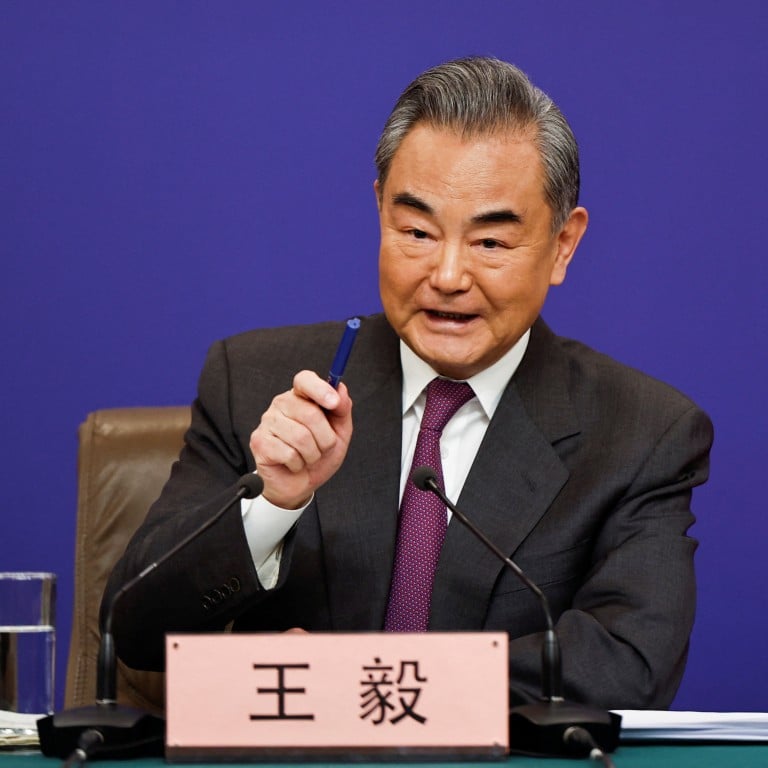
‘The next China is still China’: top diplomat pushes back against negative foreign sentiment
- Foreign minister offers assurances to international audience that country will continue ‘opening its door wider’
- China’s economic prospects are ‘booming’, Wang Yi says, refuting Joe Biden’s ‘ticking time bomb’ remarks
China’s leadership has doubled down on efforts to cast the economy in a positive light and reassure the international community that Beijing is committed to further opening to the world.
The foreign minister, who is a member of the country’s primary decision-making body, the Politburo, also pushed back on sceptical rhetoric about the world’s No 2 economy, warning that such views would end up “harming oneself” and result in “missed opportunities” during a sideline event of the “two sessions”.
“China remains strong as an engine for growth. The next China is still China,” Wang said during his press conference.
As it happened: Beijing defends GDP goal, vows crackdown on market defects
“Spreading pessimistic views on China will end up harming oneself and misjudging China will result in missed opportunities,” he said, adding that “China prospers through interaction with the world and the world is better off when China does well”.
The press conference came one day after a group of high-level Chinese officials, including the country’s top economic planner, finance minister, trade chief, top central banker and top securities regulator, struck the same positive tone on the economy while flagging more supportive measures.
China is still grappling with a flurry of long-term challenges including a protracted property market crisis, falling exports, rapidly ageing demographics, lukewarm consumer spending, a jittery private sector, worried foreign investors and ongoing competition with the United States.
There has been growing speculation about whether China’s economic boom is over, and whether the Asian giant is losing its lustre as a choice place for business and investment.
Chinese official data showed that foreign direct investment in China fell by 13.7 per cent from a year earlier in dollar terms in 2023. The slump appeared as many multinationals held back from adding major new input into the country while many relocated parts of their operations.
China’s new securities chief hits out at illegal traders, market distorters
Foreign businesses are an important source for China’s technological expertise and a secondary line of communication for Beijing’s external relations.
Last August, US President Joe Biden framed China’s economic situation as a “ticking time bomb”, saying the country was “in trouble” due to slowing growth.
But on Thursday, Wang said that China’s emerging industries are “booming”, its green transition had yielded “impressive results”, and social expectations were “improving steadily”.
As China pursues ‘new productive forces’, economic bubbles must be avoided: Xi
He said that the market of 1.4 billion consumers is unleashing opportunities for the world and China is “opening its door wider”, adding that the country is ready to expand the network of free-trade zones and keep the global supply chain stable and smooth.
He also said that China would continue to improve its business environment “to stabilise expectations and provide longer-term benefits to global investors”.
Wang’s comments on economic matters were rare for a Chinese foreign minister, and mirrored Beijing’s growing attention to overseas narratives on China’s economy.
Still, his press conference was one of the most watched events during this year’s two sessions, particularly after the earlier abrupt cancellation of Premier Li Qiang’s press conference on the final day of the event.
Wang announced that China will expand its pilot visa-free programme to include six new countries – Switzerland, Ireland, Hungary, Austria, Belgium and Luxembourg – starting from March 14.
The move was built on a series of initiatives to relax visa requirements in the second half of 2023 in a bid to woo more foreign tourists and investors.
“We hope more countries will offer Chinese citizens visa facilitation,” Wang added.

